When you’re sick, the last thing you want is to feel like no one understands or even believes you. But that’s the reality for many people with invisible illnesses. Since friends and acquaintances can’t “see” the symptoms, they may not be as supportive or empathetic of invisible illnesses as they would be for other conditions.
We asked our Mighty community with invisible illnesses to describe what it feels like to be “invisible.” They’re speaking out to illuminate how important it is to recognize that just because you can’t “see” a person’s illness, doesn’t mean they don’t need your compassion.
Here’s what they said:
1. “I can feel like I’m stuck in the middle of a crowded street, trying to explain, and everyone is walking past me, unable to see or believe that me or my illnesses are there. Invisible illnesses are lonely.” — Kaisha J.
2. “It is like having a secret identity that no one else knows about. Few people see the side of invisible illness that leaves me struggling and fighting through the day.” — Autoimmune Mess
3. “A ghost. People see your shell, but the real you that’s screaming no one can see.” — Nicole T.
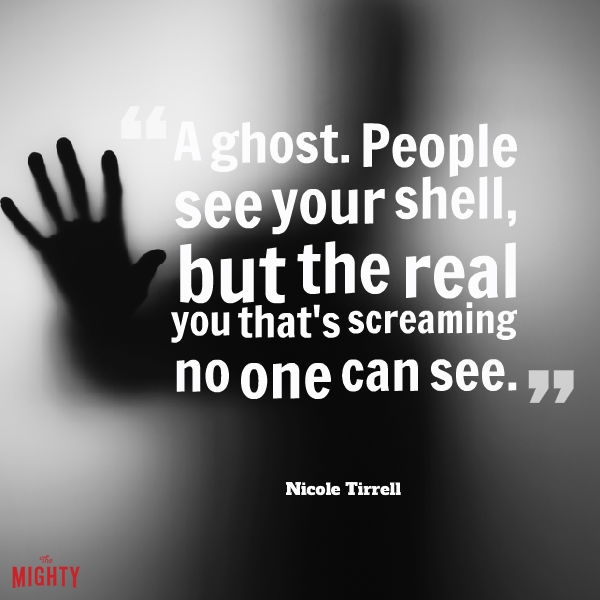
4. “It makes you feel like a liar. Nothing worse than feeling like you have to prove to people that you’re sick. So I just don’t bother trying to explain anymore.” — Susan M.
5. “I don’t want to sound like I’m whining about my illness, but because I look fine sometimes I wish I had a sign on my forehead letting everyone know I’m not.” — Paige B.
6. “Having an invisible illness is like being an actor in a movie everyone hears about but no one watches. They all have an opinion but their knowledge is lacking.” — Anna L.
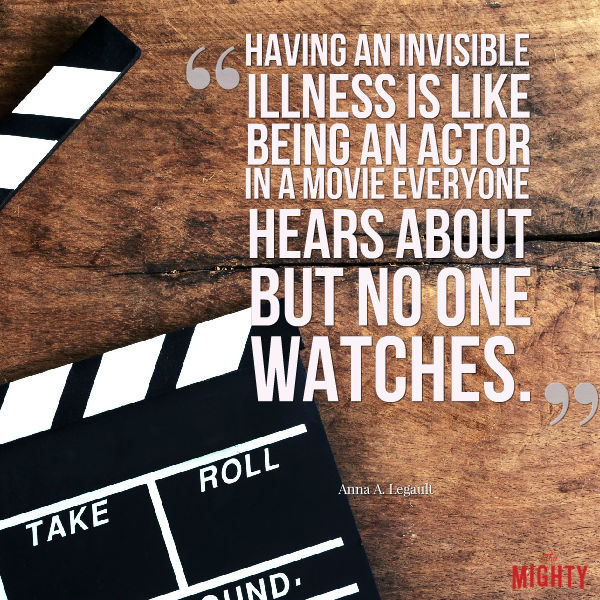
7. “It kind of feels like someone cut one of your legs off, but no one else can see that you’re missing a leg. The pain is still there, but others can’t see it, or choose not to acknowledge it. The days are hard, and long, and tiresome, and it takes all the energy you have just to wake up and get out of bed every day. But you smile and try to get through your day because at the end of the day, no one understands the pain.” — Lauren H.
8. “It’s almost like living a double life; there’s the one that everyone sees and then the life you’re actually experiencing. It can get confusing when the two collide (which happens quite often) — I feel misunderstood, alone and like I can’t live up to what the world expects of me.” — Miranda T.
9. “It is like I am surrounded by people, I am drowning and no one is trying to save me.” — Ashley M.
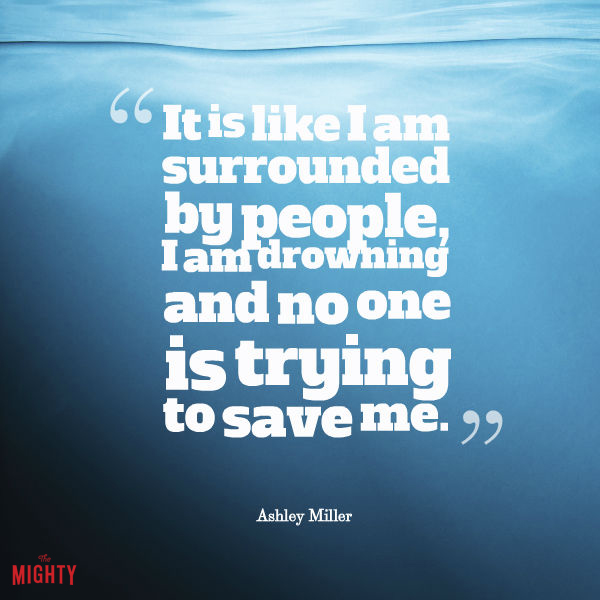
10. “For an invisible illness such as depression, you feel like you’re constantly making up excuses as to why you can’t or don’t feel like doing something, for the excuse of ‘I’m depressed’ just isn’t justifiable [to others].” — Katie Stiehl F.
11. “To have an invisible illness and feel invisible is having to explain to everyone what my illnesses are, having to repeatedly spell it for them and correct their spelling because they never spell it right or bother to look it up, being told ‘You look fine,’ ‘You don’t look sick’ and ‘You don’t look disabled’ and feeling invalidated just because they can’t see my illnesses.” — Grace S.
12. “It’s like sitting down to dinner and you’re the only one without a plate. You sit and watch everyone else eat and you are not offered anything.” — Patricia C.
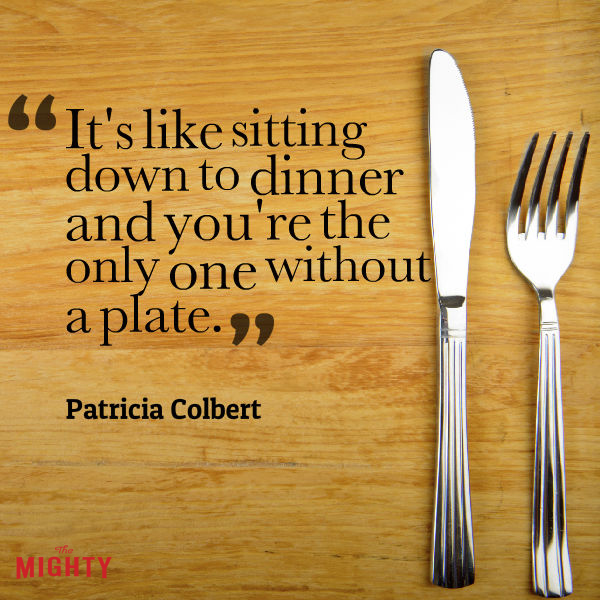
13. “I don’t really feel invisible, even though my illness is. I always feel like people are staring at me, glaring so harshly that I can’t look up to face them.” — Vanessa B.
14. “Exhausting. Everyone thinks because you are smiling that you are fine. That smile is often fake. I’m struggling and no one can tell. My professors don’t understand when I say I’m sick and can’t come to class because to them, sick is coughing or having the flu, not having bipolar disorder. Every day is a battle, but I will win, not my mental illness.” — Kendell B.
15. “Having chronic invisible illness (mine is chronic back pain and severe arthritis) is like being wrapped in cellophane. You feel constricted and unable to move at times — a prisoner in your own body. Somedays the cellophane loosens, giving you those much appreciated better days. People get confused when they see you on these good days because they think you’re better or can’t understand how you could be so much worse the next day. They cannot see this cellophane of chronic illness, but we feel it every day, some days worse than others. We take every day one day at a time and wait to see how our cellophane will react.” — Tara B.
16. “It’s like visiting a part of the world where no one speaks your language. No one understand you or your pain.” — Elly H.
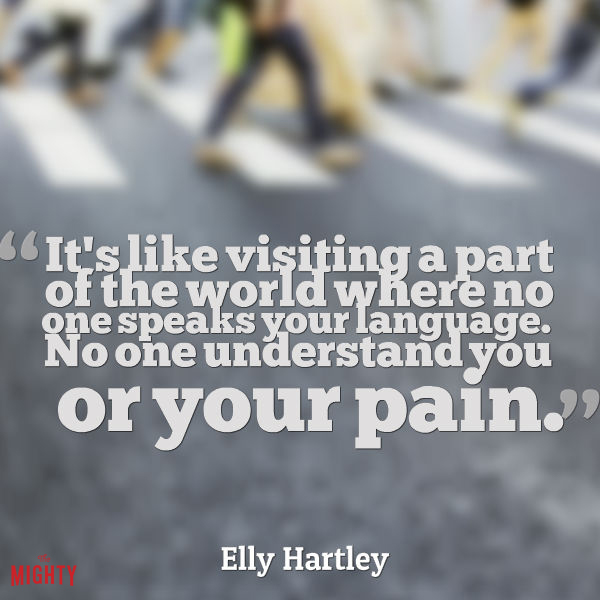
17. “Everybody sees my forced smile and hears my fake ‘I’m OK’ or ‘I’m fine.’ For once, I’d like somebody to say, ‘No, you’re not. What’s going on?’ and genuinely listen.” — Kym A.
18. “It feels like you have to justify yourself every time you experience pain or difficulty. I feel like I am not legitimate, that my needs will be viewed through a lens of my ‘label.’” — Kelly H.
19. “People stare right through me, because they’re not sure if I really am sick, like I’m just a dull piece of artwork hanging on the wall.” — Laura V.
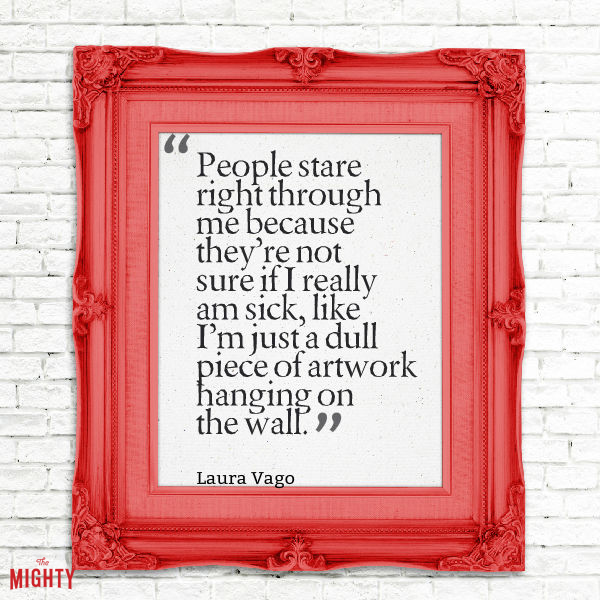
If you have an invisible illness, how would you describe what it’s like to be “invisible?” Let us know in the comments.

